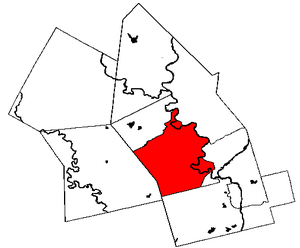Kitchener, Ontario
|
|
For other uses of the word Kitchener please see Kitchener (disambiguation).

The City of Kitchener, in southwestern Ontario, has a population of 190,399 (as of 2001 census (currently about 204,000 living in the city in 2004)). It is the seat of Waterloo Regional Municipality and is adjacent to the smaller City of Waterloo. Kitchener and Waterloo are often referred to jointly as the Twin Cities or K-W (Kitchener-Waterloo), although they have separate municipal governments.
The name Kitchener is pronounced as three syllables (KITCH-e-ner).
| Contents |
History
Missing image Downtown-kitchener.jpg Downtown Kitchener |
Missing image Kitchener-city-hall.jpg Kitchener City Hall |
Missing image Victoria-park-kitchener-monument.jpg The entrance to Victoria Park |
Missing image Victoria-park-kitchener-lake.jpg Victoria Park |
The City of Kitchener began in 1807. The Mennonite bishop Benjamin Eby led members from his community in Pennsylvania to settle in Ontario. The hamlet that was established at that time was known as Ebytown. In 1833 the Township of Waterloo was created. Ebytown was incorporated as a village and later renamed Berlin in honour of the majority German heritage immigrants. In 1853 Berlin would become the County Seat of the newly created County of Waterloo. On June 9, 1912, Berlin officially became a City and was considered to be Canada's German Capital. During World War I, the Berlin City Council, under nationalist pressure and in response to anti-German sentiment, held a referendum to choose a new name (see Berlin to Kitchener name change). As a result, in 1916 the City was renamed in honour of recently deceased British general Lord Kitchener, to demonstrate the loyalty to the British Empire of the city's ethnic German population. Today the city maintains elements of its German heritage. Although beer brewing is no longer a local industry of note, it does play host to the largest Oktoberfest celebration outside Germany. 7,310 residents (3.8%) listed German as their mother tongue in the 2001 census.
Economy
Whereas Waterloo has benefitted from the presence of two universities and a number of high tech companies, Kitchener has been a more blue-collar town. The auto-parts manufacturer Budd Canada continues to employ over 1000 workers and makes a substantial profit. The Huron Business Park is also the site of a number of industries, from seat manufacturers to furniture components. A number of the old industrial companies of Kitchener have fallen on harder times -- the Kaufmann shoe manufacturer has closed its factory, J.M. Schneider (a meat producer) has been bought out and operations scaled back, and companies like Electrohome have ceased local production in favour of licensing or supply agreements with overseas makers. Still, occupations unique to manufacturing, processing and utilities cover as much as 15% of the local workforce [1] (http://www.coldwellbankerpbr.com/commercial/kitchenerprofile.htm).
Kitchener's downtown core, though somewhat improved in recent years, has experienced considerable urban decay, thanks largely to the decline of industrial jobs in the city and the growth of its suburbs. Things worsened when urban renewal plans in the 1960s cost the city its neo-classical city hall and did not achieve its goals of redevelopment. When an arsonist began destroying abandoned and underused buildings in Kitchener's downtown, the issue of downtown renewal and cleanup of the adjoining Victoria Park neighbourhood came to the fore in municipal elections and has been the focus of city council for the past ten years. Achievements during this period include selling off a dying mall and converting it to office space for a major insurance firm, relocating a theatre downtown, and converting vacant industrial space into residential units. The city now boasts a new city hall, and a new farmer's market opened in 2004. Two university branch campuses in the downtown area are in the planning stages. Currently the Cedar Hill neighbourhood, which has been dubbed "the ghetto", is one of the city's next issues to tend to.
Government
Kitchener is governed by a council of six councillors, representing wards or districts, and a mayor. Kitchener residents also elect four councillors at large to sit with the mayor on the council of the Regional Municipality of Waterloo. The current mayor of Kitchener is Carl Zehr. He was reelected handily to his third term in November 2003 [2] (http://www.city.kitchener.on.ca/election/electionResults.asp), after first being elected in 1997 and reelected in 2000. Before that, he sat as a municipal councillor from 1985-1994.
Institutions
The Doon neighbourhood, formerly a separate village but now part of Kitchener, is home to the primary campus of Conestoga College, one of the foremost non-university educational institutions in the province.
Negotiations are ongoing to bring the Faculty of Social Work from Wilfrid Laurier University to the site of the former St. Jerome's High School in downtown Kitchener; the University of Waterloo is also considering opening a School of Pharmacy in the downtown area.
Sports teams
- Kitchener Rangers of the Ontario Hockey League who play at the Kitchener Memorial Auditorium Complex
- Kitchener Panthers of the Intercounty Baseball League who play at Jack Couch Park
- Kitchener Dutchmen of the Ontario Hockey Association who play at the Kitchener Memorial Auditorium Complex
- KW Braves Jr. A Lacrosse (http://www.kwbraves.com) of the Ontario Lacrosse Association who play at the Waterloo (http://en.wikipedia.org/wiki/Waterloo%2C_Ontario) Rec Centre.
References
- Kitchener Community Profile (http://www.coldwellbankerpbr.com/commercial/kitchenerprofile.htm)
External links
- City of Kitchener (http://www.city.kitchener.on.ca/)
- Kitchener-Waterloo Oktoberfest (http://www.oktoberfest.ca/)
- Centre in the Square (http://www.centre-square.com/)
- The Record Newspaper (Serving Waterloo Region) (http://www.TheRecord.com)
- Satellite image (http://maps.google.com/maps?q=Kitchener,+Ontario&spn=0.189514,0.341263&t=k&hl=en) courtesy of Google Maps
de:Kitchener (Ontario) fr:Kitchener
